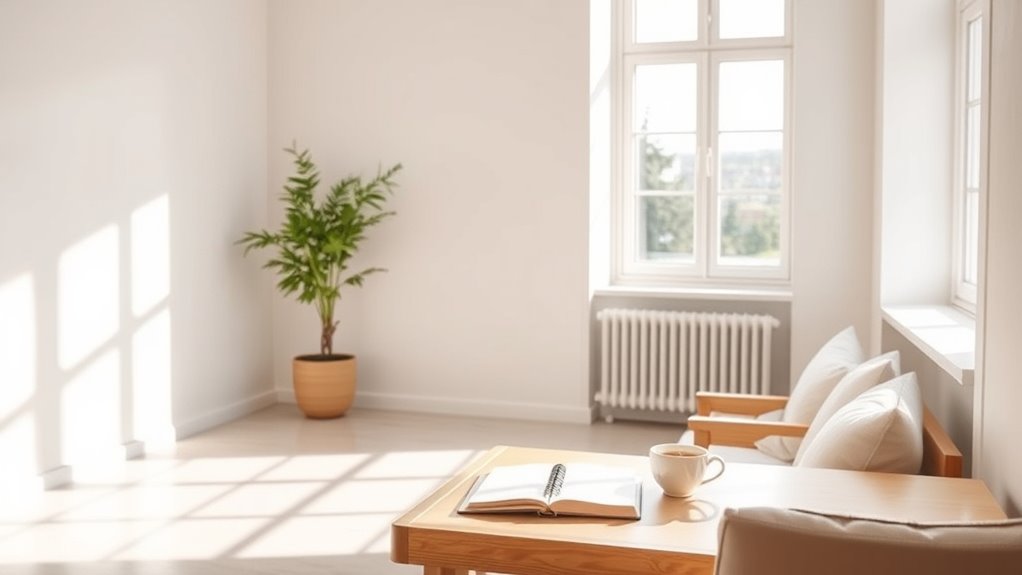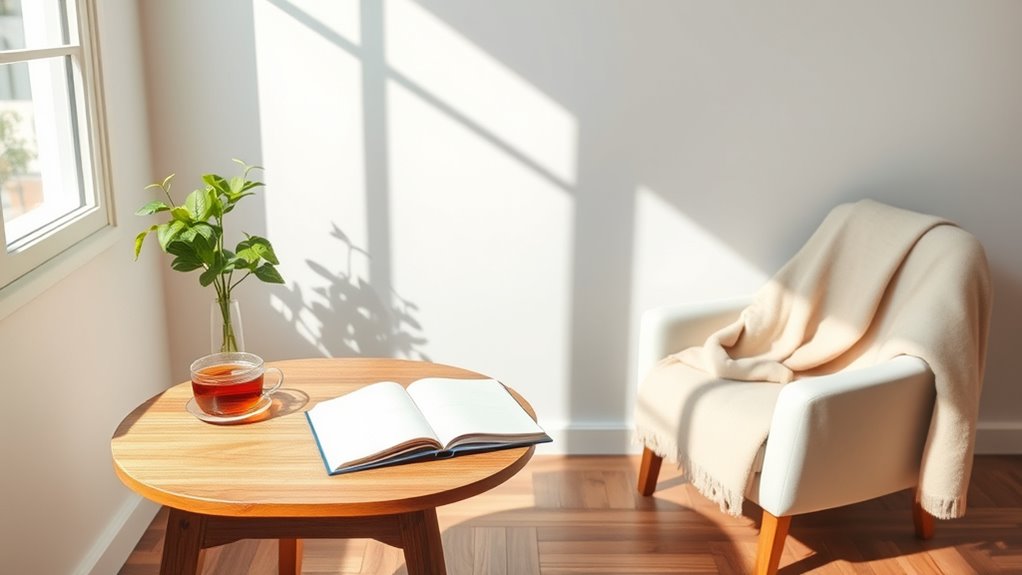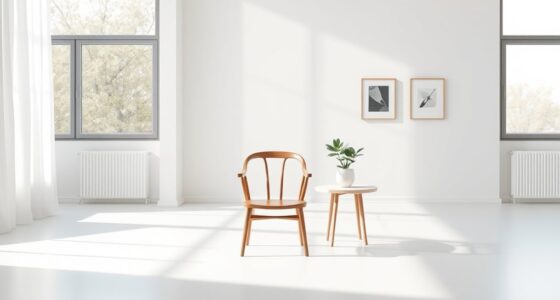Decluttering your home can clear your mind and boost mental clarity. You might notice that a messy environment leads to stress and difficulty focusing. By reducing physical clutter, you foster a sense of control and accomplishment. This creates a peaceful atmosphere that encourages positive thinking and relaxation. Tackling your decluttering process step-by-step can help you manage emotional attachments to items. Discover how this journey can enhance your well-being and promote mindfulness in your daily life.
Key Takeaways
- A clean space reduces stress and boosts mood, fostering a more positive mental state.
- Decluttering enhances focus and clarity, alleviating anxiety associated with physical clutter.
- Letting go of items that evoke strong emotional attachments promotes personal growth and reduces mental burdens.
- Implementing a "one in, one out" policy helps maintain organization and prevents future clutter accumulation.
- Regular decluttering sessions create a calming environment that encourages mindfulness and enhances overall well-being.
Signs of a Cluttered Mind

Have you ever noticed how a cluttered mind can feel overwhelming? You might find it hard to focus on tasks, and your to-do list grows longer, filling you with stress and anxiety.
Distractions from social media or even mundane activities can keep you from engaging productively, amplifying that mental clutter. You may also feel time slipping away, either racing by or dragging, affecting your overall well-being.
If you often feel stuck in routines, it's a clear sign you need to make a change. To clear your mind, consider creating a clutter-free environment. Implementing multi-functional furniture can help maximize your space and create a more organized atmosphere.
The Connection Between Physical and Mental Clutter

While you mightn't realize it, the state of your physical space can greatly influence your mental clarity. When you live in a cluttered environment, it often mirrors the chaos in your mind, leading to increased stress and anxiety.
Studies show that messy homes correlate with higher reports of depressed moods, highlighting the connection between physical and mental well-being. By decluttering your home, you create a tidy space that fosters focused thinking and creativity.
Messy homes often lead to depressed moods; decluttering can enhance focus and spark creativity.
This process also provides a sense of control and accomplishment, which can greatly impact mental health. A cleaner, organized environment alleviates anxiety and promotes healthier habits, ultimately enhancing your emotional well-being. Incorporating mindfulness practices during the decluttering process can further enhance your mental clarity.
Embrace the power of decluttering to improve your mental state.
Practical Steps to Declutter Your Home

A clear mind starts with a clear space, and taking practical steps to declutter your home can lead to significant improvements in your mental well-being.
Begin by tackling one area at a time—like a drawer or closet—to avoid feeling overwhelmed. Implement a "one in, one out" policy to maintain an organized space, ensuring that for every new item you bring in, an existing one goes out.
Use storage solutions such as drawer dividers and labeled containers to keep items accessible and minimize visual clutter. Schedule regular decluttering sessions, ideally with the changing seasons, to refresh your environment.
Finally, clear countertops and surfaces to create functional workspaces that enhance productivity and reduce distractions in your daily life. Additionally, this process fosters mindfulness, fostering a deeper connection with your surroundings, which can further enhance your emotional well-being.
The Psychological Benefits of a Clean Space

A clean space can greatly impact your mental health, lowering stress and boosting your mood. By reducing clutter, you enhance your focus and clarity, allowing for clearer thinking and creativity. Creating a peaceful environment not only helps you feel more in control but also promotes a sense of accomplishment. Additionally, maintaining a clean space can foster positive thinking, which is linked to improved mental well-being and resilience.
Clutter and Mental Health
Clutter acts like a weight on your mind, pulling you down and heightening stress levels. Studies show that cluttered environments can spike cortisol levels, leading to increased anxiety and negatively impacting your mental health.
Conversely, living in neat spaces correlates with lower depression rates and higher well-being. When you declutter, you not only create a tidy environment but also enhance your cognitive function, allowing for clearer thinking and emotional stability.
Engaging in decluttering gives you a sense of satisfaction and accomplishment, fostering a positive mindset. A clean and organized home becomes a sanctuary, promoting relaxation and emotional recovery. Additionally, addressing clutter can help mitigate the impact of a borderline parent on your mental well-being, as a stable environment fosters healthier emotional development.
Ultimately, addressing clutter can greatly improve your overall mental health, making you feel lighter and more at ease in your space.
Boosting Focus and Clarity
When you step into a clean, organized space, it's easier to feel focused and clear-headed. A decluttered environment lowers cortisol levels, reducing anxiety and enhancing your ability to concentrate.
By organizing your space, you create a positive atmosphere that boosts your mood and mental well-being. Consider these benefits of a tidy area:
- Improved creativity and efficiency due to fewer distractions
- Enhanced decision-making and problem-solving capabilities
- A greater sense of control, alleviating anxiety
Maintaining a decluttered space not only fosters clearer thinking but also promotes better cognitive function. By breaking tasks into smaller, manageable steps, you'll find that when your surroundings are organized, your mind can truly focus on what matters, making it easier to tackle tasks and achieve your goals.
Creating a Peaceful Environment
Creating a peaceful environment not only enhances your well-being but also encourages a positive mindset. A clean and organized space greatly reduces cortisol levels, helping you feel less anxious and more at ease.
When you declutter your home, you experience a sense of peace, which allows you to think more clearly and creatively. Studies reveal that tidy environments lead to higher happiness levels and lower depressive moods.
Engaging in cleaning and organizing can also serve as a productive distraction from stress, promoting a sense of control and accomplishment. This is particularly beneficial as emotional and psychological growth is influenced by our surroundings.
By fostering a peaceful atmosphere, you minimize distractions and enhance your mental clarity, ultimately contributing to better overall mental health and well-being.
Embrace decluttering for a brighter, more peaceful mind.
Maintaining a Decluttered Environment

To maintain a decluttered environment, it's vital to develop consistent habits that keep your space organized. Start by dedicating a few minutes each day to tidy up, ensuring clutter doesn't reaccumulate.
Embrace a one in, one out policy; for every new item you bring home, let go of an old one. Schedule regular decluttering sessions, ideally with the changing seasons, to reassess your belongings.
- Focus on accessible essentials for improved productivity.
- Remove unnecessary items that hinder mental clarity.
- Commit to ongoing efforts to enjoy lasting benefits.
Embracing Mindfulness Through Decluttering

A decluttered home not only supports an organized space but also paves the way for embracing mindfulness.
When you declutter your mind, you create a serene environment that reduces anxiety and stress. This process serves as a mindfulness practice, allowing you to focus on the present moment and make intentional choices about what you keep.
A tidy space fosters mental clarity, enhancing productivity and creativity by minimizing distractions. Engaging in decluttering gives you a sense of control and accomplishment, reinforcing positive emotions in your daily life.
Additionally, mindful decluttering encourages self-reflection on your emotional attachments, helping you release items that no longer serve you. Embracing this practice truly lightens your mental load and fosters a more peaceful state of mind.
Frequently Asked Questions
How Can I Declutter My Home and Mind?
To declutter your home and mind, start by tackling one space at a time.
Sort through your belongings and set aside items you no longer need. Create a designated spot for everything you keep.
Incorporate a daily tidying habit, and consider a one-in-one-out policy for new items.
As you clear physical clutter, you'll find it easier to focus and think clearly.
Enjoy the sense of accomplishment that comes with your organized environment!
What Is the 50% Rule in Decluttering?
The 50% Rule in decluttering suggests you aim to cut your possessions in half.
This approach encourages you to critically evaluate each item, keeping only those that serve a purpose or spark joy. By focusing on halving what you own, you make the decluttering process less overwhelming and more achievable.
As you witness the transformation in your space, you'll likely feel a sense of accomplishment and enjoy improved mental clarity and focus in your daily life.
What Happens to Your Brain When You Declutter Your Home?
Did you know that people living in cluttered homes are 77% more likely to feel overwhelmed?
When you declutter your home, your brain experiences reduced stress and anxiety, leading to lower cortisol levels. This helps enhance focus and boosts productivity, making it easier to tackle tasks.
Additionally, organizing your space can create a sense of accomplishment, mirroring emotional clarity.
Ultimately, a tidy environment fosters a positive mindset and improves your overall mental well-being.
What Is the 12-12-12 Rule for Decluttering?
The 12-12-12 rule is a simple but effective decluttering strategy. You find and remove 12 items to discard, 12 to donate, and 12 to relocate.
This method breaks down the overwhelming task of decluttering into manageable steps. By focusing on 36 items, you'll feel a sense of accomplishment and motivation to continue.
It's a great way to create a clearer space, making it easier for you to maintain an organized environment.
Conclusion
Imagine stepping into a home so pristine it feels like a serene sanctuary, where every item sparks joy and your mind dances with clarity! You've transformed chaos into calm, releasing a tidal wave of creativity and peace. As you embrace this newfound freedom, remember: a decluttered home isn't just about the space; it's a revolution of the soul! So, take that leap, and watch how your life transforms into a vibrant masterpiece of tranquility!









